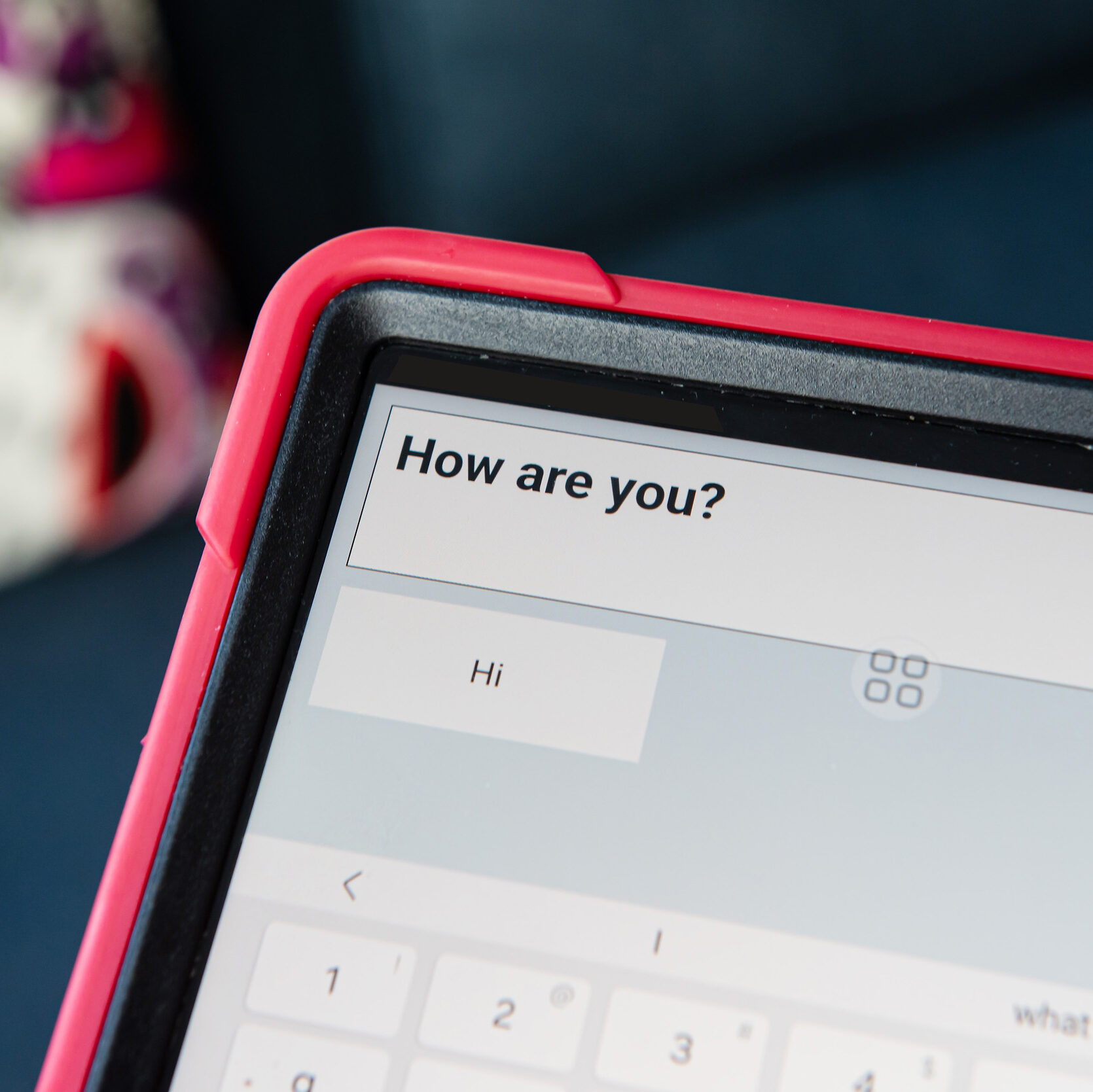October is Augmentative and Alternative Communication (AAC) awareness month. AAC is a massive part of who I am. Let me tell you why.
Firstly, what is Augmentative and Alternative Communication? It refers to the various ways to communicate feelings, thoughts and needs when you have difficulty with oral speech.
There are a couple of ways that I can communicate. The first is through my tablet with one of two text-to-speech apps for different situations. One app displays my text in reasonably large format, so I use it in my day-to-day life as I prefer people to read what I have typed rather than translate it into speech. It’s also free, which is a plus. The other app has a more precise voice translation, which I typically use when I present online and in person.
The second way I communicate is through verbalising the sounds of letters. I will sound out each letter of a word, working my way through an entire sentence. Some letters can sound similar when I verbalise them, so I use my finger to draw them in the air simultaneously. This is my preferred method of communication, but it is often difficult for people to understand me at first, so I mainly rely on my tablet. Hilariously, however, 99% of people can understand me when I swear.
Through most of my experiences and interactions, I have discovered that people usually assume I’m cognitively impaired and make assumptions about my needs because I can’t speak. I find it very frustrating that people still haven’t addressed or unpacked ableist biases in this contemporary age. Further, it is disheartening that I don’t have access to the same opportunities as every other able-bodied person due to who I am and how I communicate. If people spent 10 minutes genuinely getting to know me, they would learn that I am smart, coherent, and fully capable of conversing effectively and making my own decisions.
In an attempt to combat unwanted interactions, I have attached an introduction card to my wheelchair tray. I use it to inform people new to me about how I communicate. It currently reads:
“Hiya! I’m Jono.
I’m unable to talk like most people, so I use my tablet to communicate. I can hear and comprehend everything you say just fine, and I am still listening to you even while I’m typing. You can see what I have to say by reading from my tablet. It may take me some time to type out sentences, but I love to have a chat. If I’m unclear in my responses, please let me know, and I can rephrase them.
My interests are (but are not limited to) sports, poker, chess, board and card games, Football Manager and crime shows.
Don’t be afraid to approach me; I love meeting new people and engaging in friendly conversation. I’m an open book, so I welcome any questions. I’m not just a man on wheels!”
My frustration with people making assumptions about me also extends to my dating life. It seems that if you don’t look or communicate in a certain way, most people will automatically “swipe left”. They won’t even consider that the person might have been a potential romantic match.
I am fully aware that a conversation with me takes a little longer than usual. I can only ask for patience while I type what I want to say, but I am also cognisant that everyone wants everything right away in this fast-paced world. People often begin talking to the person with me (such as a support worker or friend) instead of directly to me. Sometimes they will stand there waiting for my companion to answer for me when I have already started typing my answer. This makes me feel like a child whose parent is doing all the talking for them. I am very knowledgeable and enthusiastic about specific topics such as sports (especially AFL), computers and the NDIS, to name a few. I also love having deep and philosophical conversations. I believe more people would realise that I have things in common with them if they took the time to communicate with me in the way that it has to work for me.
It’s not only individuals who behave this way towards me. Organisations like the NDIA (which manages a scheme, the NDIS, built solely to assist people with disabilities) rarely take the time to actively listen and support me with my needs. I have been a participant in the scheme for over four years and recently discovered that my file didn’t even list that I am non-verbal. Each time I ring them, with the assistance of a support worker, they always ask to speak to me directly, despite my inability to speak.
Unsurprisingly, most companies and organisations don’t have systems or protocols in place for non-verbal customers. This has made it tremendously hard to arrange basic things over the phone, such as internet, utilities, and banking. Unfortunately, it is usually no better when visiting these businesses in person as the employees communicate with my support workers and ignore me.
I would be curious to see how people treated me if I was still in my wheelchair but didn’t have a speech impairment. Is it my overall appearance or the fact that I can’t communicate in a conventional way that has to do with how I’m treated?
